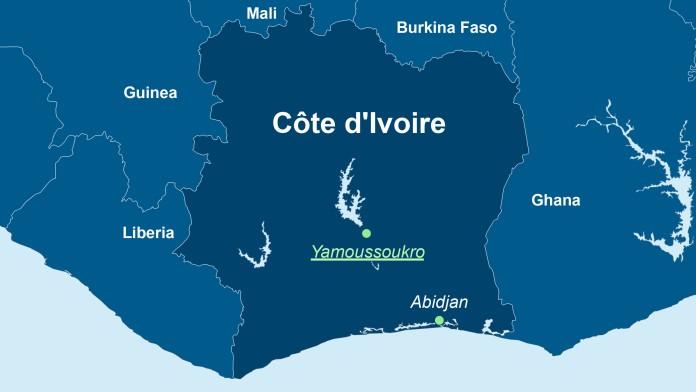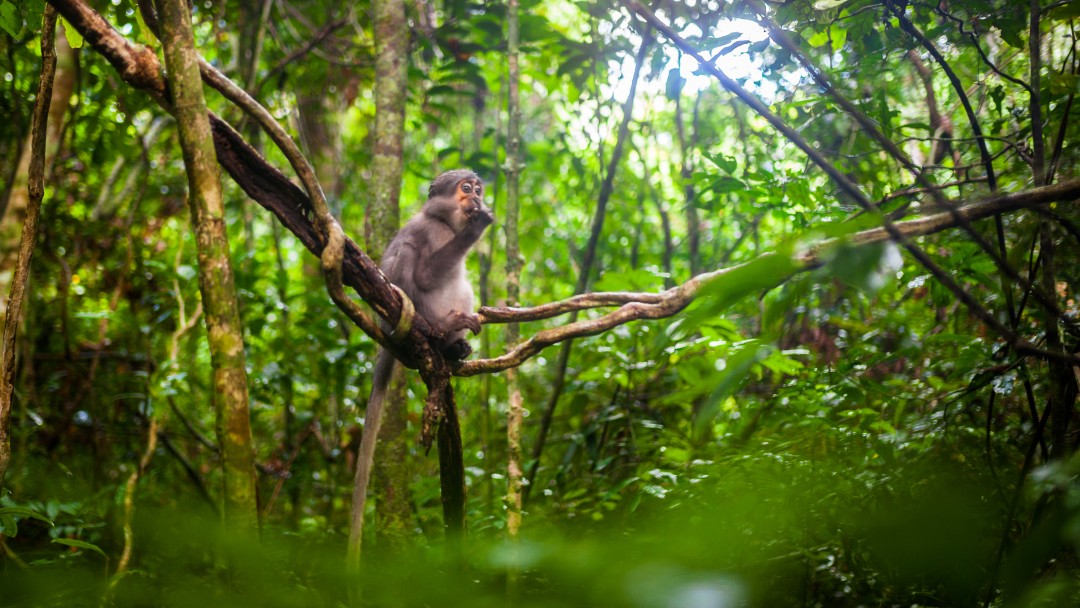
As of: 04/2024
Côte d'Ivoire has unique flora and fauna in its conservation areas. However, these ecological resources are under threat: species loss is progressing rapidly, partly due to dwindling forests in the country. Agriculture needs land, especially in order to grow important export goods. On behalf of the German Federal Government, KfW is making a financial contribution to the Foundation for the Parks and Reserves of Côte d'Ivoire – Fondation pour les Parcs et Réserves en Côte d'Ivoire (FPRCI) – to cover the running costs of the Taï, Comoé, Cavally and Bossématié conservation areas in the long term. To prevent the isolation of Taï National Park, a voluntary protected area is being set up as an ecological corridor to Grebo-Krahn National Park in Liberia. In addition, important investments are being made in the north to equip Comoé National Park and develop its local communities
Côte d'Ivoire has great natural value for West Africa’s biodiversity: In Taï National Park and the adjacent N’Zo Reserve, a natural paradise extends across more than 500,000 hectares. Forest elephants and chimpanzees are among the 145 documented species of mammals, some of which live here exclusively – like the pygmy hippopotamus. Due to its critical importance for biodiversity, Taï National Park was declared a UNESCO World Heritage Site in 1982. In the north, Comoé National Park, also a UNESCO World Heritage Site, is a unique example of an ecologically intact, preserved forest savanna, covering 1.1 million hectares.
Germany’s development cooperation has been supporting the management of the two natural parks for many years through KfW and the Gesellschaft für Internationale Zusammenarbeit (GIZ) together with conservation organisations. Like other conservation areas in Côte d'Ivoire, they are under enormous pressure. The growing population is clearing more and more forest area to use it for agricultural purposes. The rainforest has been pushed back, with only a few islands now remaining. This breaks up forest areas, preventing population exchanges, which threatens biodiversity.

The government of Côte d'Ivoire is working to improve the protection of existing areas and create new protected areas. On behalf of the German Federal Government, KfW is supporting the government of Côte d'Ivoire to implement its goals and is committed to preserving biodiversity.
KfW has been supporting the Foundation for the Parks and Reserves of Côte d'Ivoire Fondation pour les Parcs et Réserves en Côte d'Ivoire (FPRCI) on behalf of the Federal Ministry for Economic Cooperation and Development (BMZ) since 2009, with capital contributions of almost EUR 75 million.
The returns from the foundation’s assets will finance the annual operating costs for the Taï and Comoé National Parks and, from 2025, the Cavally and Bossématié areas, which were recently classified as nature reserves. In Comoé National Park, KfW is supporting the creation and rehabilitation of the infrastructure required to manage the park.
This includes the procurement of necessary equipment and the training of rangers. A landing strip and hangar have been built to make it easier to monitor the park. Bridges and fords were repaired. A drone and two ultra-light planes will, in future, help gamekeepers to uncover violations of national park rules and implement regular biomonitoring. KfW is also financing health stations, primary schools and water retention basins for villages on the edge of the national park as well as the establishment of corridors where pastoralists can drive their herds through the area as usual.
The forest areas of Taï National Park in Côte d’Ivoire that have already become islands are to be connected to the Grebo-Krahn National Park in neighbouring Liberia via an ecological corridor. Under the leadership of the Ivorian Ministry of the Environment, a participatory study explored how a corridor like this could be established. The green corridor would have the status of a voluntary nature reserve (Réserve Naturelle Volontaire) and be established with the close involvement of the local population. KfW is contributing funds amounting to EUR 6 million to establish and manage this corridor.
Taï National Park is one of the largest protected rainforests in Western Africa today. At the same time, it is considered to be the best preserved national park in the country, not least because of the many years of German development cooperation.
In consultation with the local residents, the park management has requested the responsible ministry to establish a voluntary protected area along the Saro River, which flows from Taï National Park to the Cavalla River at the border. Municipalities are involved in the management of natural resources and play an active role in local decision-making processes. Land ownership that must be abandoned for the sake of conservation will be compensated. The participatory approach has enhanced cooperation between the national park administration and the population.
KfW’s promotion was used to expand the infrastructure in Comoé National Park. New buildings and landing strips have been built. The administration of the protected areas can now better monitor the species populations.
The first signs of success are visible. The populations of animals in the national parks have recovered. The last movement count of animals in Comoé Park in 2022 shows that the number of individuals for the most important species is already above the 2024 target value for 2024. The International Union for Conservation of Nature has now upgraded both national parks in its assessment – an important achievement for Côte d'Ivoire, which simultaneously paves the way for further protected areas
The project contributes to the achievement of these following United Nations Sustainable Development Goals:
KfW Group
KfW Development Bank
Biodiversity, Agriculture and Water West Africa
Share page
To share the content of this page with your network, click on one of the icons below.
Note on data protection: When you share content, your personal data is transferred to the selected network.
Data protection
Alternatively, you can also copy the short link: https://www.kfw-entwicklungsbank.de/s/enzBx42h
Copy link Link copied